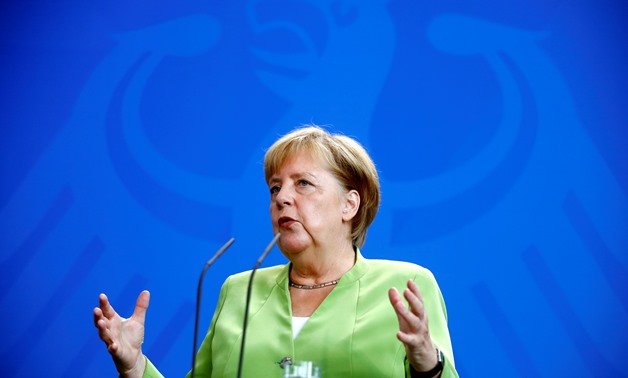
German Chancellor Angela Merkel speaks during a news conference with Bosnia-Herzegovina's Prime Minister Denis Zvizdic (not pictured) at the chancellery in Berlin, Germany August 13, 2018. REUTERS/Hannibal Hanschke
BERLIN - 17 August 2018: The German cabinet will soon decide on a proposal to make it easier for skilled workers from outside the European Union to move to Germany to take a job, a paper seen by Reuters shows, as Germany seeks to alleviate chronic labour shortages.
Such plans could be sensitive in a country where anti-immigration sentiment has helped drive support for the far-right Alternative for Germany (AfD) party and a row over asylum policy almost toppled Chancellor Angela Merkel's government in July.
The new proposal mainly addresses relaxing migration policy for professionals outside the EU, since EU citizens enjoy free labour movement in the bloc.
A lack of skilled labour and a shortage of young people willing to commit to on-the-job training for up to 3-1/2 years have become big concerns for managers in Europe's largest economy.
Germany bet on more than a million refugees who arrived in 2015 to fill workforce gaps, but a lack of German-language skills and the inability of most refugees to prove any qualifications has slowed the process.
A record 1.2 million jobs remain unfilled in Germany, the Federal Labour Office said earlier this month.
The German Interior, Labour and Economy ministries agreed to recruit more foreign skilled labour to Germany, the paper seen by Reuters showed.
They have sent the proposal paper to the rest of the cabinet, which will take a decision on it soon and changes to it are still possible, two government sources said.
"We will adjust the federal government's concept of skilled labour and focus on three areas: domestic, European and international skilled worker potentials," the paper, on which Interior Minister Horst Seehofer took the lead, said.
Seehofer, leader of the Christian Social Union (CSU) - Bavarian sister party to Chancellor Angela Merkel's Christian Democrats (CDU), takes a hard line on immigration and asylum issues. He vowed in July to present a migration law for professional workers by autumn.
Seehofer faces a tough regional vote in Bavaria in October, when the AfD is expected to win seats in the state assembly. The anti-immigrant AfD's popularity has surged since the migrant influx and it became the country's third largest party in September's election.
Germany already has a "blue card" system that makes it easier for companies to hire foreign academics and professionals.
The paper proposes that the government will no longer insist that companies give preference to German citizens in filling vacancies before looking for non-EU foreigners.
Graduates and workers with vocational training will have an opportunity to come to Germany to look for a job within a certain period of time if they meet qualification and language requirements.
They will not have access to social welfare benefits during that period but will be allowed to work in jobs for which they are overqualified so they can earn some money, the paper added.
Qualification recognition procedures in Germany will become faster and easier, the paper said, adding that the government is planning an advertising campaign in selected countries.

Comments
Leave a Comment